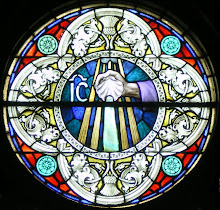 Here is the homily Pope Benedict XVI preached to some 500,000 gathered at the home of Mary in Loreto, Italy, and to the youth of the world, with my emphases:
Here is the homily Pope Benedict XVI preached to some 500,000 gathered at the home of Mary in Loreto, Italy, and to the youth of the world, with my emphases:Jesus Christ, God made man, took on our flesh in Mary, took part in our life, and shared our history. To realize this new alliance, God looked for a young heart and found it in the girl Mary. Even today, God seeks out young hearts, he is looking for young people with great hearts, capable of making room for him in their life in order to be active players in the New Alliance.
In order to welcome a proposal as fascinating as that which Jesus offers us, in order to make an alliance with him, one must be young interiorly, able to let oneself respond to newness, in order to undertake new paths with him. Jesus has a predilection for young people, as we can well see in his dialog with the rich young man (cf Mt 19,16-22; Mk 10,17-22). He respects the freedom of youth, but he never tires of proposing to them higher goals in life: the novelty of the Gospel and the beauty of holy conduct.
Following the example of the Lord, the Church continues to give young people the attention that he did. That is why, dear young people, the Church looks at you with immense affection, it is with you in moments of joy and celebration, as well as in trials and confusion; it sustains you with the gifts of sacramental grace and it accompanies you in discerning your true vocation.
Dear young people, if you allow yourselves to be involved in the new life that comes from the encounter with Christ, you will be able to be apostles of his peace in your families, among your friends, within your church community, and in the different circles in which you live and work.
But what is it that makes one ‘young’ in the evangelical sense? This encounter of ours, which is taking place in the shado0w of a Marian sanctuary, invites us to look at the Madonna. And we ask ourselves: How did she live her youth? Why did the impossible become possible in her?She discloses it to us herself in the canticle of the Magnificat: God “has regarded the humility of his handmaid” (Lk 1,48a). Mary’s humility is what God appreciated most in her. And the other two readings of today’s liturgy speak to us of humility.
Is it not perhaps a happy coincidence that this message comes to us precisely here in Loreto? Here, our thoughts go naturally to the Holy House of Nazareth, which is the shrine of humility: the humility of God-who-became-man, who made himself small; and the humility of Mary who welcomed him in her womb - the humility of the Creator and the humility of his creature.
From this meeting of humility, Jesus was born, Son of God and Son of Man. “The greater thou art, the more humble thyself in all things, and thou shalt find grace before God”, a passage from Ecclesiastes tells us (3,20); and Jesus, in today’s Gospel, after the parable of the wedding guests, concludes: “For every one who exalts himself will be humbled, but the one who humbles himself will be exalted” (Lk 14,11).
This prospect indicated in Scriptures appears even more provocative today because of the culture and sensibility of contemporary man. The humble is considered one who has given up, a failure, someone who has nothing to say to the world.
On the contrary, this is the master way, and not only because humility is a great human virtue, but because, in the first place, it represents God’s own way. It is the way chosen by Christ, the mediator of our New Covenant, who, appearing in human form, “humbled himself, becoming obedient unto death, even to the death of the cross (Phil 2,8).
Dear young people, I see in this Word of God on humility a message that is as important as it is relevant to you who wish to follow Christ and be part of his Church. The message is: do not follow the way of pride, but that of humility. Go against the current: do not listen to interested and persuasive voices that, from many sides today, advocate life styles marked by arrogance and violence, arrogance and success at any cost, given to appearance and to possession to the detriment of being.
How many messages, which are reaching you especially through the mass media, are addressed to you! Be vigilant! Be critical! Do not be drawn into the wave produced by these powerful acts of persuasion.
Do not be afraid, dear friends, to prefer the ‘alternative’ ways indicated by true love: a life style that is moderate and fraternal; emotional relationships that are sincere and pure; an honest commitment to study and work; a profound interest in the common good.
Do not be afraid to appear different and to be criticized for what appears to be a losing cause or unfashionable.
Your contemporaries - but even adults - especially those who seem most remote from thementality and the values of the Gospel, have a profound need to see someone who dares to live according to the fullness of humanity that was shown by Jesus Christ.
Dear friends, humility is not therefore a way of resignation but of courage. It is not the outcome of failure but the victory of love over selfishness, and grace over sin. Following Christ and imitating Mary, we should have the courage of humility. We should entrust ourselves humbly to God because only then can we become obedient instruments in his hands, allowing him to work great things in us.




No comments:
Post a Comment